2005 All England Masters International Championship - Retrospective
5-Jun-20054BR looks back at the Cambridge examination on Cloudcatcher Fells, when the Scottish Co-op were the best prepared to conquer the great Lake District peaks.
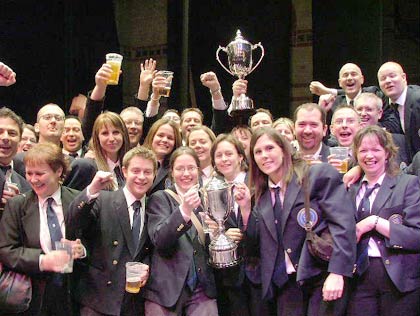
Scottish Co-op celebrate their win
Audio interviews:
![]() Interview with Resident MD Ray Tennant [WAV 833kb]
Interview with Resident MD Ray Tennant [WAV 833kb]![]() Interview with Adjudicator William Relton [WAV 1.19Mb]
Interview with Adjudicator William Relton [WAV 1.19Mb]![]() Interview with Best Intrumentalist: Paul Robinson [WAV 470kb]
Interview with Best Intrumentalist: Paul Robinson [WAV 470kb]
Climbing mountains is a risky business at the best of times – trying to paint a musical picture of them as you are doing so, is just about impossible though.
Given that not one band came through the process of conquering the immense peaks of ‘Cloudcatcher Fells' unscathed at Cambridge, it did however come as a surprise that so many of them set out on their musical ascent kitted out in the equivalent of a pair of open toed sandals, shorts and t –shirt.
All the bands that made the trip to the first International Masters surely came with high hopes of doing well on John McCabe's wonderful set work, but the secret of success is surely in the preparation and the knowledge of what problems may befall them on a test piece such as this.
However, by the end of the day, you did wonder how many of the MDs had even a passing knowledge of the Lack District and its wonderful awe inspiring landscape, whilst more than a few bands revealed themselves to be musical ramblers rather than serious mountaineers of the test piece.
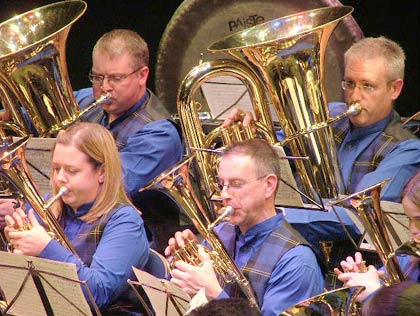
Scottish Co-op: Horns and Basses
In the end it was a band and a MD who knew exactly how they should be kitted out for the challenge that won the day: Scottish Co-op and Dr. Nicholas Childs came to the contest prepared in waterproofs, boots and crampons, (with the exception of soprano player Gordon Jenkins, who actually did wear open toed sandals of the PC social worker, Guardian readers variety). And even if they did suffer from one or two hairy moments on the scree filled slopes of ‘Grisedale Tarn' and ‘Angle Tarn', they were still the only combination on the day that made a fully coherent musical ascent to the summit of the test piece.
The reason they won, even though they did have a couple of serious moments of rope snapping tension was revealed by two of the judges, William Relton and John Miller when we spoke to them after the announcement of the results.
"There is real magic in this score," William Relton told us. "…and the winners had that magic. Their quiet playing was excellent and they really captured the atmosphere as well as the broad majesty of the musical picture that John McCabe so brilliantly set out."
John Miller was also in agreement. "We (the judges) were in complete agreement about the winners. It was an excellent musical performance with so much quality and thought given to each of the sections of the work. They did have a couple of moments of unease – but they were not alone in that today, and it didn't spoil the musical intentions that they were trying to create."
The win also gave the MD, Nicholas Childs his third ‘major' to add to his CV that now boasts three Nationals, and a European Championship. If he adds the British Open to that list in September (he currently has three runners up places there) he will become the first conductor to bag all four major brass band championships.
That wasn't something he really gave a great deal of thought to when we spoke to him later on Sunday night as he finally made it to his home. "I'm delighted for the band. We have worked really hard on the piece in the past couple of weeks, and I thought we put in a very good performance on stage. I must thank Ray Tennant for the preparation work he has done with the band, but especially the players who responded so well to what I wanted to do with the piece. I enjoy working with the band a great deal and they showed once more what a fine band they are."
Asked about the decision to place the three horn players at the back of the stage to play the opening section (marked p possible), Nick added, "I just thought it was a sensible approach given the acoustic of the hall and the need to really create the atmosphere at the beginning of the piece. It seemed to work."
The MD of Black Dyke now holds the current National, European and Masters titles, so could a possible Grand Slam be on the cards come the Open in September? "That is a long way ahead and before that Black Dyke's 150th anniversary concert on June 10th is taking up all my thoughts. That is going to be a huge event and something I am looking forward to immensely."
This may have been a brand new era for the Masters contest, but in many ways it was the traditional virtues of good brass band playing that proved to be indispensable here once more.
Cambridge in late May may not be as hot as Corfu or Corsica, but the temperature inside the Corn Exchange was at times equally as humid and oppressive. It also meant that with the players having to walk into the hall from a much lower ambient temperature outside, tuning, especially for the horns and lower band at the beginning of the piece became a huge problem.
A number of performances got off to shaky starts as players found dry mouths allied to sharpened instruments meant potential winning performances stalled before they even developed beyond those opening three bars.
It is becoming a huge problem here, as the air conditioning system creates too much residual noise during performances (something one or two bands did well to overcome when it was left on during a couple of performances), whilst the layout of the hall itself means that there is little through flow of air even when the emergency doors are opened.
The result was an uncomfortable atmosphere in which to play, whilst the audience (especially those in the top tier) were in danger of keeling over from dehydration. Given the dangers of global warming, in a few years, the bands here could very well be taking to the stage in shorts, sandals and t shirts.
The 2005 contest itself got off to a pretty warm start with the draw (segmented once more to help the bands) giving the audience (not full by any means, and another possible worry for the organisers) plenty to enjoy before they sweated off the pounds.
Grand Shield Champions, Hepworth (Persimmon Homes) were the first on the stage, whilst they were to be followed by Rothwell Temperance, Buy As You View, Willebroek, Travelsphere Holidays, Sellers International, Tredegar and Kirkintilloch.
Given that some critics had questioned the strength of the line up here following the changes imposed by Messers Biggs and Franklin, it wasn't a bad start was it? In the end, six of these eight ended up on the top nine come the results.
Hepworth produced a solid account that further confirmed their ensemble and solo line quality, but never quite did enough to suggest that they were going to add to their recent impressive list of wins. It was the type of confident performance though that given a more favourable draw could have seen them claim a top six place, and come the Open in September will surely see them provide a very strong competitive presence. Eighth place was a very good return (the same as 4BR), with the promise of more to come.
Our only real gripe was of the non musical kind – the rather gormless self congratulatory celebration of a couple of their players at the end of their performance; self praise and aggrandisement is best left to the likes of Abi Titmus or the clowns of the Big Brother household.
The under rated Rothwell Temperance then gave an equally fine account of themselves under David Roberts that also showed their qualities to the full. Just a rather prosaic and untuneful ‘Angle Tarn' did for their chances at coming higher than their eventual 7th place (the same as 4BR), but they were very good. The combination continues to improve and impress.
Then the two heavyweights of BAYV and Willebroek, both of whom produced crafted technical performances lacking that little ‘extra' that would have made them into winners.
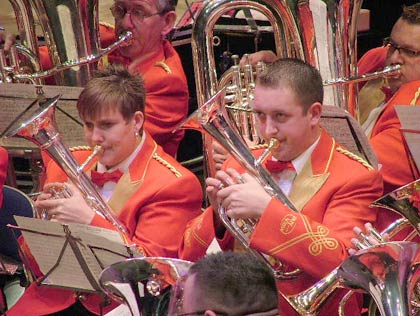
Buy As You View: Horn Section
BAYV started a little nervously in the horns, but soon a lovely understated and controlled performance unfolded. It also confirmed the recent evidence that the sound of the band has become much warmer and more balanced, with an awesome organ quality in the final ‘Helvellyn' section that was in contrast to the delicate and detailed filigree work in ‘Haystacks' and ‘Catstyecam'.
All their usual technical brilliance was on show for sure, but allied to a less strident feel in the loudest sections it was the performance to beat – and so it proved. 2nd place from the judges – David Read commented that, "…it was an excellent performance that just felt a little uncomfortable to start," and 2nd place from us. A later draw may just have given them victory.
Willebroek must have wondered what to make of the inspiration for the test piece. Coming from a country not exactly renowned for Dolly Partonesque peaks of glory (and Cambridge only really offered some uncomfortably high police speed bumps of the Tara Palmer Tompkinson variety) theirs was a performance that was technically excellent but so lacked an atmospheric feel for the musical picture.
However, with five regular cornet players missing due to examinations, their chances of victory were reduced greatly on a piece that places such huge demands on that particular section. As a result, the back row featured the two youngest players of the day, who could not have been more than 9 years of age each (we understand that they were the MDs young sons).
They, and the rest of the players responded splendidly under the direction of Frans Violet, but the rather too obvious ‘depping' of parts to the top two solo cornet players made for the opening three sections of the work lack tonal contrast. The rest of the quicker sections were played with a superb assuredness, but come ‘Angle Tarn' the same lack of cornet balance came to the fore.
Willebroek are a class band with outstanding individual players (Bert Van Thienan on sop was the pick of them), and even if they didn't quite show that fully here, the audience were left in no doubt of their future potential. We had them 4th, the judges 9th.
There were many pre contest experts who thought Travelsphere Holidays would make an impact here, but few would have thought for the reasons that they and the other tipped contenders, Tredegar eventually did.
Both gave performances that would be best described as ‘disappointing' if we were being kind - ‘blinking awful' if we weren't. We are not – so ‘blinking awful' it is.
Travelsphere were not the only band on the day to fall foul of poor intonation, but none suffered as badly as they did to start. By the time the band has made it through to ‘Haystacks' theirs was a damage limitation exercise, and just when things started to sound more like the Travelsphere of the Grand Shield, along came ‘Angle Tarn' and more horrid sounds. It was one of those days when they knew it wasn't a good one and were not looking forward to hearing their fate, which was 17th from the judges 15th from us.
The same goes for Tredegar, who just a fortnight earlier had won with a fine account of the work at the Ebbw Vale contest. This though was so error strewn that if they had been climbing in the Lake District they would have had to be flown to hospital by Mountain Rescue before they had got out of base camp. They are a band very much in the rebuilding phase at present and their confidence is fragile to say the least, but even though Michael Fowles shaped the music with a fine sense of style, he was let down by a disastrous catalogue of slips. 15th from the judges, 17th from us.
In between these poor offerings came a robust account from Sellers International and Philip McCann, which found favour with the three men in the box who placed them in 5th spot. We had them slightly lower in 9th, as we felt the lack of dynamic variance, especially in the more reflective sections would cost them.
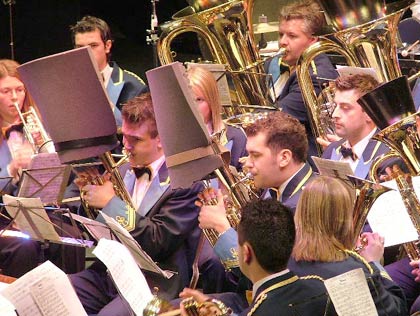
Sellers International: Horn section using foam packaging as a mute
We were wrong, although their experimental use of what looked like foam egg packaging taped to two of the horns at the beginning was more visually than aurally successful. Sellers though are a very confident band and that confidence is not misplaced as they continue to impress where it counts – on the contest stage.
Kirkintilloch drawn number 8 started superbly under Steve Bastable, and with the cornet section arranged in an inner arc, the sound in the opening sections had a wonderfully balanced feel.
It was just when they reached ‘Angle Tarn' that it felt uncomfortable for us, as it sounded slightly overcooked, but a bold and very solid final third section brought them back on track and the judges felt it was deserving of a very fine 4th place.
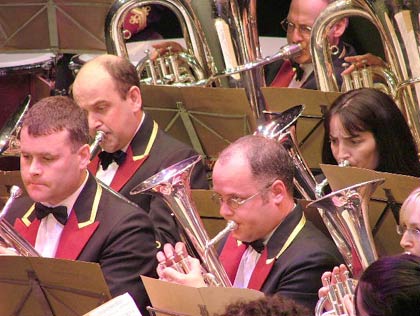
Kirkintilloch: Middle of the band
We had them further back than that in 10th, but it must be said, Steve Bastable continues to impress seasoned judges with his very musical interpretations. Sometimes he does look for the music in every bar when there is no real need, but when he gets it spot on he does bring that hidden ‘something' from a score – and this was in the opinion of the judges, one such occasion.
Of the next four bands on stage, only Reg Vardy off the number 11 draw really caught the ear of the adjudicators, but BTM, Aveley and Newham and Redbridge all produced well rehearsed accounts that contained much to admire.
BTM can count themselves very unlucky to have ended up 16th in the final results after producing a solid, if unmemorable account under John Berryman. The start was perhaps the best of the day, but soon after they had one of the worse moments when the bass end suffered collective amnesia and the piece very nearly ground to a halt.
The recovery was impressive and by the time they reached the end, there wasn't much else that went remotely wrong. They were perhaps heavily punished for a rather ‘safe' dynamic approach, but on a day when they were by no means alone in this, 16th (we had them 12th) was harsh.
Aveley and Newham produced a workmanlike (or should that be sherpa like) performance, which for us had too many basic problems with it to feature higher than its eventual 11th place (we had them 14th). It was the lack of balance, especially with an over dominant bass line that possibly cost, although their technical playing was very secure and showed again that they are bridging the gap between themselves and the best major contesting outfits.
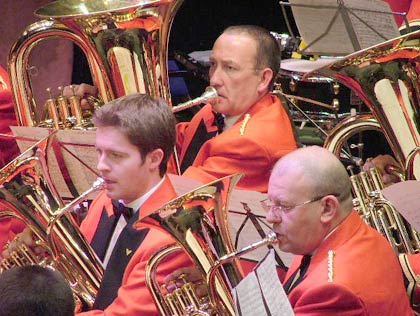
Reg Vardy: Paul Robinson leads the lower end
Reg Vardy and Ray Farr bridged that gap over a year ago and have not looked back since. Here they again showed that they are contenders for the top most prizes at the major contests with a hugely impressive account that just fell short by them trying too hard to impress in places they didn't need to.
Full of confidence, a super opening and with a lovely shape and feel, it could have been closer to the top three if it wasn't for a bit of raggedness in the louder passages and a harshness of sound at the very end.
At the Open and with London to come they will be a band to contend with. 5th place from the judges (we had them 5th as well) was well deserved, whilst their fine euphonium player Paul Robinson produced a superb individual performance to capture the 4BR Best Soloist Award and £250 for his efforts on a day when some high flying soprano players more than fancied their chances of taking our cash.
Redbridge, like Aveley are trying to make the leap that Reg Vardy has done, and like their fellow Londoners they once again showed that the gap is diminishing on each contest outing. This was a very confident show, with Melvin White once more producing a sensible approach that didn't ever ask anything from his players that he knew they couldn't give (although a special mention for the timp player, who was by far the best of the day).
The overall quality is not quite there yet (the balance sometimes goes awol) to challenge for the top most honours, but they are getting there and 10th place was well deserved. We had them 11th.
The next three bands contained the winners, Scottish Co-op and Fodens Richardson who were many peoples tip to take the title, both before and after they had played.
Fodens Richardson were possibly undone by their opening, which sounded nervous and clippy and took a while to settle, as thereafter Garry Cutt and his team produced a wonderful account that combined superb technique and ensemble precision to a beautiful serenity in the central ‘Angle Tarn' that only the winners, Scottish Co-op topped all day.
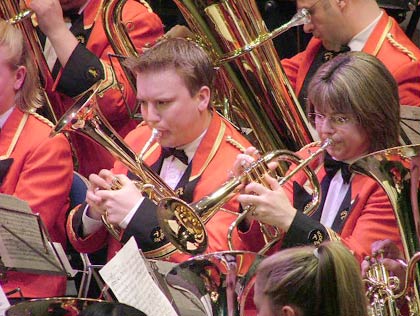
Fodens Richardson: Flugel and horns
The opening ‘Great Gable' was not in the same class though, and a premptive glock later on may just have cost them the difference between first and their eventual third place from the judges. We had them as winners – although only by the narrowest of margins from BAYV and Scottish Co-op. They will take some beating at the Open though.
SWT Woodfalls and Frank Renton took to the stage straight after Fodens, and after coming 4th here last year they were determined to show that it was not a ‘one off'.
Unfortunately, it sounded very much like that from the word go, despite a very elegant reading from the MD that was spacious yet flowing. Too many unforced errors, balance problems and lack of precision in the ensemble cost them dearly, although when it did click it sounded very high class indeed. 13th from the judges, 16th from us – it had the potential for so much more.
Scottish Co-op are one of those bands that you know can produce winning performances at the very highest level, even if they sometimes also produce performances that leave you scratching your head in bewilderment at times.
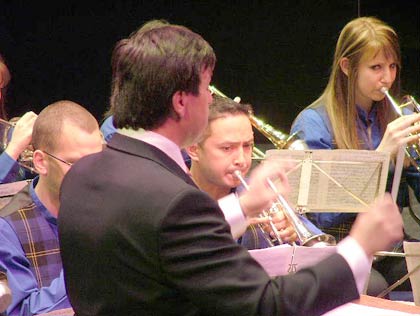
MD Nick Childs leading the band
Here they were outstanding under the baton of Nicholas Childs, and even though they did suffer a couple of real moments of unease, it was the overall musical picture they painted that caught the ears of the judges and gave them the top prize.
It started well with the horns stood at the back of the hall (the one piece of horn choreography that worked all day) and thereafter it blossomed with control and subtlety.
The first nasty moment came at the end of ‘Grasmoor' when the baritone entries were unsure and the flugel pick up was lumpy, whilst later in ‘Angle Tarn' the flugel plopped a wrong ‘un in the 4th final bar that just robbed the serenity of a quite wonderful movement.
However, apart from this, the overall picture was so coherent that it mattered little – the dynamic contrasts were the best of the day and each of the movements flowed into each other as if you had walked to the top of one breath taking sight in the Lake District, to immediately be presented with the next.
We had them 3rd, the judges as winners, but it was hard to really disagree, especially after you heard what they had to say (although the audience didn't, as the judges, disappointingly kept schtum).
Meanwhile, Carlton Main are due a change of luck. Here they produced a wonderful performance that impressed many in the hall (we had them 6th), but the three that mattered didn't quite like what Brian Grant and his hard working team of talented players produced and placed them 14th.
Perhaps we misread this one completely; for us there wasn't much wrong from start to finish, as there was a great sense of control, especially in the dynamics, a real flow and serenity to the more reflective sections and the ability to allow themselves a final balanced push right at the end. Every contest has a result which leaves you wondering, and this was it here. Unlucky is an understatement.
The final two bands gave very contrasting performances that left you admiring the one, querying the other.
The admiration had to go to 1st Old Boys who played their hearts out and showed that they had prepared themselves thoroughly for their appearance here. MD, Stephen Cairns produced an intelligent reading (nothing overdone, and a real ear for the limitations as well as the strengths of his line up), and even if it did lack the quality in sound and technique against this high class field, it was a performance that was worthy of the occasion. 18th from the judges and from 4BR should not be seen as a reflection of a lack of application – but of encouragement. Next year they will come back the better band for this experience.
The final band on the day was Flowers under the direction of Philip Harper.
Over the years this combination has delighted and infuriated in equal measures; on their day (especially here, as well as the recent Grand Shield) they show themselves to be a band of the highest class, whilst every now and again, (London 2003 amongst others) they opt for something more than a bit ‘left field' which leaves you wondering ‘what on earth was that all about?'
This was one of those.
Philip Harper is one heck of a talented musician, who knows what he wants. The problem is sometimes, it is not what everyone else thinks as well. Here he opted for a very slow opening ‘Great Gable' followed by an up tempo ‘Grasmoor' (both are marked chrotchet = 60) and ‘Grisedale Tarn' which was much slower than the 58 beats indicated on the score.
The result was a subtle as a rock fall hitting you on the bonce, and although you must admire the individuality, in this case with so much quality to play with in the ranks of the band, you wondered why on earth there was a need to do it. ‘Angle Tarn' for instance was a dirge, but the rest was as good as anything on the day.
This was not so much a curate's egg, but a flaming big prehistoric pterodactyl one, fried, poached and especially on this occasion, scrambled.
Flowers are a delight to listen to – good or bad – they never give you anything other than very interesting and 12th from the judges could have been as high as 2nd or 3rd or as low as 16th or 17th. We had them 13th.
That was the final performance on a day when the heat got the better of more than a few bands on the stage, and quite a few more of the audience which may have explained why at times the hall was barely more than half full.
Scottish Co-op won't mind though and neither will Nicholas Childs. Climbing mountains, even musical ones is best done with the bare minimum of distracting company, so why worry if their successful ascent wasn't applauded by a packed summit full of people. The result is all that counts. And the result was a win for the Co-op.
Iwan Fox















